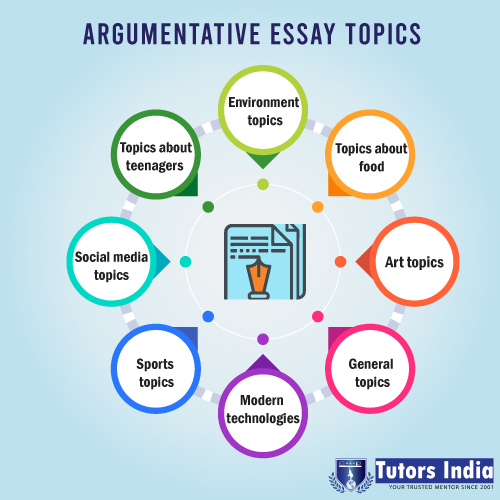How to choose Interesting Argumentative Assignment Topics?
In Brief:
- You will find the Best Assignment Topicsfor future researchers enrolled in various subjects.
- In order to identify future assignment topics, we have reviewed the Subjects. (Recent peer-reviewedstudies).
- Locating effective argumentative essay ideas isn’t as difficult as choosing a needle in the haystack, as long as you stick to a few basic guidelines.
- Key to Writing a Successful Paper of this sort is to present convincing evidence for each position to the reader.
Introduction
An argumentative essay is a sort of academic work in which all sides of an issue are discussed via arguments (claims). Both sides might be evenly matched, or one could be the dominant force. The style of the document is determined by the writer’s attitude toward the topic. The fundamental goal of an argumentative essay is to persuade readers to alter their minds if they have a different viewpoint than the writer. Locating effective argumentative essay ideas isn’t as difficult as choosing a needle in the haystack, as long as you stick to a few basic guidelines (Southworth, 2021).
Discrimination exists in a lot of problematic argumentative essay themes. They frequently have the unspoken goal of proving presumptions. It is always necessary to comprehend both sides when writing an essay. Choose a topic about which the students are largely apathetic. Tutors India has the best experienced team to help the graduates in choosing interesting argumentative assignment Topics. You will find the best assignment for future researchers enrolled in all subjects. These topics are researched in-depth at the University Of Glasgow, UK, Sun Yat-sen University, University of St Andrews and many more.
The topic for an argumentative essay should be arguable so that you can come up with both justifications and counterpoints. Furthermore, the essay subjects should be intriguing, with solid evidence as well as at least two opposing points of view, as well as presented in persuasive language, so that readers can see all sides of an issue and select which one they prefer.

Fig1: Argumentative essay topics
Source: Homeworkfor (2022)
It may appear that writing a solid argument essay is simple since the scholars have a viewpoint on it and then offer the opposing viewpoint to explore a problem. The key to writing a successful paper of this sort is to present convincing evidence for each position to the reader. However, keep in mind that everything is not arguable (Zimmermann & Mayweg-Paus, 2021).
Here are some great ideas to consider while choosing an argument essay topic:
- Pick a topic that the scholar is passionate about.
Choose a topic about which they are knowledgeable and can properly communicate the viewpoint.
- Try to stay away from pure facts.
Because statements are simply pieces of evidence, debating them is tough.
- Choose a topic that isn’t too broad in scope.
Scholar’s doesn’t want the topic to be overly broad to allow for debate. Reduce it to a precise point that may be argued about.
- When looking for a topic, stay away from emotionally sensitive areas.
It may be tough for the students to fight with a clear mind on an issue that makes them feel strongly.
- Consider the target audience.
Consider who might read the essay and try to guess what their thoughts will be on the topic they have chosen. Think about if the audience would think it’s really interesting.
- Assist oneself.
Ensure that having solid and persuasive facts to back up both own and the opposing viewpoints.
- Try something new.
Choose a topic that is highly debatable or that others may have opted to avoid. It will set the topic apart from other “common” topics. Make sure, though, that one can present reasoning on all sides of the debate.
- Consider the immediate surroundings.
Consider the disadvantages or prohibitions that exist in the immediate environment. Dare to bring up and discuss such topics.
- Consider writing as a means of expressing ones thoughts.
Consider a subject that people previously believed was necessary to discuss with others. Notice how much easier it is to write down owns thoughts than it is to tell others what oneself believe about something. They don’t have any physical touch with them, hence this is the explanation behind this. Make the argument essay about that issue.
- Take a step back in time.
Try to remember if one ever gotten into a fight with someone about a particular subject.
A good argumentative essay has a decent framework and a compelling argument, however there are a few more elements to keep in mind to help one to make the case even stronger.
Download our internationalization critical theories related Reference book/papers such as tutorials, proprietary materials, research projects and many more @ https://www.tutorsindia.com/academy/resources/
Focus
It’s easy to get overwhelmed by all of the material and complexities in the argument as the students writing it. It’s critical to keep on track, to be clear about the thesis, and to focus on facts that actively support it. Tutors India helps to assist the students with more explanatory details (Mohamed Rubiaee, Darus, & Abu Bakar, 2020).
Be Rational
It’s critical that the statements and proof be focused on facts rather than speculation. That’s why it’s critical to cite credible sources that are grounded in research and reporting; otherwise, the ideas will be easily debunked. Don’t base the decision only on how they feel about the subject. If one can’t back up a claim with genuine proof, it opens the door to counterarguments that didn’t expect.
Tutors India has vast experience in developing theories for students pursuing in UK. Order Now
Example topics
- PPTELL-3 a scaffolding tool to assist learners in argumentative writing (Fan & Chen, 2021)
- The intersection of gender and culture in argumentative writing (Tsemach & Zohar, 2021)
- The progression of collaborative argumentation among English learners: A qualitative study (Su, Liu, Lai, & Jin, 2021)
- How does online peer feedback improve argumentative essay writing and learning? (Latifi, Noroozi, Hatami, & Biemans, 2021)
In order to identify the assignment work, we have reviewed the report (recent peer-reviewed topics) on all subjects.
Conclusion
Thus, make sure readers have clear and specific proof to back up anything they say, and the accusations will be a lot stronger! Thus to know more about this topic the students can approach Tutors India, where we always serves the best in helping scholars to achieve their dream.
References
- Fan, C.-Y., & Chen, G.-D. (2021). A scaffolding tool to assist learners in argumentative writing. Computer Assisted Language Learning, 34(1–2), 159–183. https://doi.org/10.1080/09588221.2019.1660685
- Homeworkfor. (2022). Argumentative Essay Topics & Ideas. Retrieved from https://homeworkfor.me/blog/100-good-argumentative-essay-topics-find-fresh-ideas-absolutely-free
- Latifi, S., Noroozi, O., Hatami, J., & Biemans, H. J. A. (2021). How does online peer feedback improve argumentative essay writing and learning? Innovations in Education and Teaching International, 58(2), 195–206. https://doi.org/10.1080/14703297.2019.1687005
- Mohamed Rubiaee, A. A., Darus, S., & Abu Bakar, N. (2020). The Effect of Writing Knowledge on EFL Students’ Ability in Composing Argumentative Essays. SSRN Electronic Journal. https://doi.org/10.2139/ssrn.3512623
- Southworth, J. (2021). How argumentative writing stifles open-mindedness. Arts and Humanities in Higher Education, 20(2), 207–227. https://doi.org/10.1177/1474022220903426
- Su, Y., Liu, K., Lai, C., & Jin, T. (2021). The progression of collaborative argumentation among English learners: A qualitative study. System, 98, 102471. https://doi.org/10.1016/j.system.2021.102471
- Tsemach, E., & Zohar, A. (2021). The intersection of gender and culture in argumentative writing. International Journal of Science Education, 43(6), 969–990. https://doi.org/10.1080/09500693.2021.1894499
- Zimmermann, M., & Mayweg-Paus, E. (2021). The role of collaborative argumentation in future teachers’ selection of online information. Zeitschrift Für Pädagogische Psychologie, 35(2–3), 185–198. https://doi.org/10.1024/1010-0652/a000307

 Previous Post
Previous Post Next Post
Next Post